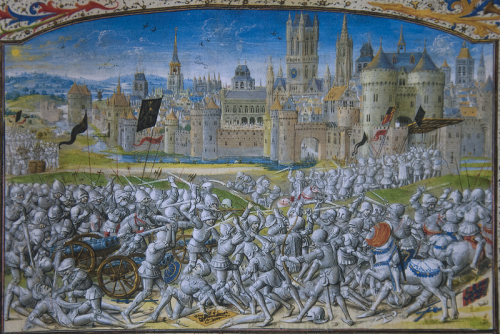The Drunken Battle of Beverhoutsvelt,During the mid 14th century Flanders (parts of Belgium and the
The Drunken Battle of Beverhoutsvelt,During the mid 14th century Flanders (parts of Belgium and the Netherlands) was ruled by Louis II, Count of Flanders, who was basically a puppet of the French. The Flemish nobles, however, wanted local rule rather than French control. In 1379 the Flemish revolted against Louis II and ousted him from power. Louis II took shelter in the fortified city of Bruges. In May 1382 the Flemish soldiers laid siege to Bruges in order to oust Louis II.The Louis’ Army outnumbered the rebels by 5 to 1. Although outnumbered, the rebels set up heavy fortifications and laid siege to the city. Meanwhile in France King Charles IX was organizing a large army the crush the rebellion. Louis had every advantage. All the Louis had to do was hold Bruges until the French Army arrive.On May 3rd the city celebrated the Procession of the Blood, an annual holiday in Bruges. Despite the state of siege, the people celebrated the holiday regardless. Wine, mead, and ale flowed freely, and during the festivities Louis’ soldiers got rip roaring drunk. While drinking and driving may be dangerous, drinking and warmaking is especially disastrous. After consuming several rounds of liquid courage the soldiers of Bruges began to make very big talk; talk of how despite being outnumbered and outgunned the courageous men of Bruges could easily whip those dastardly rebels. After a round of motivational shouting and drinking, the soldiers of Bruges began to feel invincible, and decided the go on the offensive to show those rebels what they were made of. Against Louis’ orders, the outnumbered men of Bruges decided they were going to attack.After a disorganized and hasty cannon volley, the Bruges city gate opened and Louis’ army charged the rebels en masse. At the front were the handgonners who wildly fired bullets in all directions. Then came the men at arms and knights. The knights, too inebriated for combat, either fell off their horses or accidentally rode down their own men. The men at arms also tripped over each other as they made a drunken charge. As they reached the lines of the rebel army, they were immediately mowed down by gunfire from volley guns, cannon, and archers. Most of the Bruges army immediately turned tail and ran. Those who didn’t were easily cut down when they reached the rebel lines. As the drunken soldiers retreated back toward the Bruges city gates, Bruges cannoneers, handgonners, and archers mistook the retreat as a rebel attack and fired on their own men. The battle finally ended when the Flemish rebels attacked the retreating army’s flanks, causing the drunk, panicked mob to scatter in all directions. Moments later the rebels simply walked into the open gates of Bruges, easily dispatching what enemy soldiers remained who could put up a fight.Louis II, Count of Flanders was able to escape from Bruges without being captured. A short time later Louis II returned to Flanders with an army of over 10,000 French soldiers. He was restored to power and ruled until his death in 1384. -- source link
#history#middle ages#drinking#drunk#alcohol#beverages#battles#war#rebellion#medieval#medieval history#flanders#bruges

